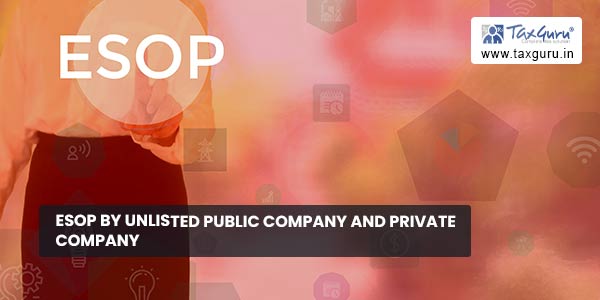Employee Stock Option Scheme (ESOP) by an unlisted public company and private company under Companies Act, 2013.
A Company pursuant to Section 62 (1) (b) of Companies Act, 2013 can issue shares of the Company to its employees under either Employee Stock Option Scheme or Employee Stock Purchase Scheme by passing a Special Resolution (Ordinary Resolution in case of a private company, exception granted pursuant to Notification dated 5th June, 2015) and subject to compliance with Rule 12 of The Companies (Share Capital and Debentures) Rules, 2014.
Difference between Employee Stock Option Scheme (ESOS) & Employee Stock Purchase Scheme (ESPS)
ESOS: Scheme offered by the Company to its employees to purchase the shares of the Company by exercising the option vested to them pursuant to scheme.
ESPS: An option provided by the Company to its employees to purchase the shares of the Company at a discounted price or at a price favourable to them.
The major difference between them is, under ESOS the equity shares are offered after the vesting period whereas in ESPS shares are offered immediately after approval of Scheme/Plan.
Eligible Employees:
1. Permanent employees of the Company who has been working in India or outside;
2. Directors of the Company including whole-time Director and excluding Independent Director; or
3. Employees as defined above of a subsidiary company (in India or outside) or of a holding company of the Company.
Ineligible Employees:
1. Employees who are promoter or belongs to the promoter group; or
2. Director who either himself or through his relative or through any body corporate, directly or indirectly, holds more than 10% of the outstanding equity shares of the company.
Provided that the above ineligibility shall not be applicable to a start-up Company as defined in Notification No. G.S.R. 127(E), dated 19th February, 2019 issued by the Department for Promotion of industry and Internal Trade for a period of 10 years from the date of its incorporation or registration, whichever is earlier.
Therefore, permanent employees, whether they are promoter or belongs to the promoter group or not and directors of the above mentioned Company (Start-ups), irrespective of their holding shall be eligible to be granted with ESOP or ESPS up to a period of 10 years from the date of incorporation or registration.
Procedure:
1. Passing of Board Resolution and issuing Notice of General Meeting along with the explanatory statement specifying the disclosures as prescribed in Sub-rule 2 of Rule 12;
2. Passing of Special Resolution or Ordinary Resolution (In case of private company);
3. Filing of MGT-14 within 30 days from the date of passing resolution;
4. Grant of Option (In case of ESOS);
5. Entry in the register of Employee Stock Options (SH-6);
6. Vesting of Option (In case of ESOS);
7. Exercising of option by the employees pursuant to the Scheme or Plan;
8. Issuance and allotment of Shares;
9. Filing of PAS-3 within a period of 30 days from the date of allotment; and
10. Entry in the register of Members (MGT-1).
Valuation of Shares
Method of valuation of Shares, offered to the employees, has not been specifically mentioned in Companies Act, 2013, therefore the Companies can opt for any method for determining the fair market value of the share. Further, the company granting option to its employees pursuant to Employees Stock Option Scheme will have the freedom to determine the exercise price in conformity with the applicable accounting policies.

Further, it is to be noted that, if the Company is making provision of money for purchase of its own shares by employees or by trustee for the benefits of employee, valuation of shares to be purchased shall be determined by a registered valuer (Rule 16 of The Companies (Share Capital and Debentures) Rules, 2014.
Income Tax Applicability:
As per Income Tax Act, 1961, such shares are included in the definition of salaries as prescribed under section 17(1) read with section 17(2)(vi) and are taxable under the Head Salaries.
Perquisite=Fair Market Value-Exercising Price
Other Important Provisions:
1. Separate Special Resolution is required:
-
- In case of grant of option to employees of subsidiary company; or
- In case of grant of option to identified employees, during any one year, equal to or exceeding one percent of the issued capital (excluding outstanding warrants and conversions) of the company at the time of grant of option.
2. The Company may, by passing Special Resolution, vary the terms of ESOS not yet exercised by the employees, provided that such variation shall not be prejudicial to the interest of option holders.
3. There shall be a minimum period of one year between the grant of options and vesting of option.
4. The option granted to employees shall not be transferable to any other person;
5. The option granted to the employees shall not be pledged, hypothecated, mortgaged or otherwise encumbered or alienated in any other manner.
6. Further, the Board of Directors of the Company shall disclose the details of ESOS (more specifically prescribed in Sub Rule 9 of Rule 12 in the Director’s Report for the year.
7. In case of death of employee while in employment, all the options granted to him till such date shall vest in the legal heirs or nominees of the deceased employee.
8. In case the employee suffers a permanent incapacity while in employment, all the options granted to him as on the date of permanent incapacitation, shall vest in him on that day.




